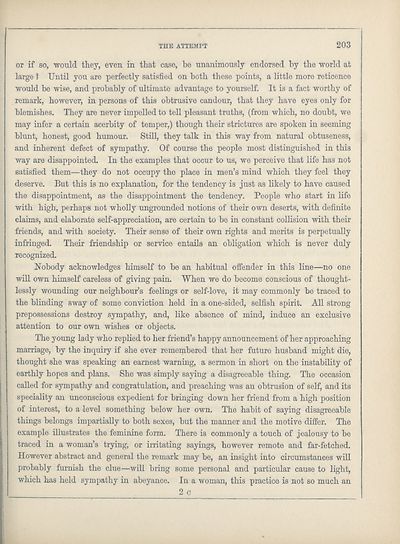Attempt > Volume 1 and Select writings
(215) Page 203
Download files
Complete book:
Individual page:
Thumbnail gallery: Grid view | List view

THE ATTEMPT
203
or if so, would they, even in that case, be unanimously endorsed by the world at
large t Until you are perfectly satisfied on both these points, a little more reticence
would be wise, and probably of ultimate advantage to yourself. It is a fact worthy of
remark, however, in persons of this obtrusive candour, that they have eyes only for
blemishes. They are never impelled to tell pleasant truths, (from which, no doubt, we
may infer a certain acerbity of temper,) though their strictures are spoken in seeming
blunt, honest, good humour. Still, they talk in this way from natural obtuseness,
and inherent defect of sympathy. Of course the people most distinguished in this
way are disappointed. In the examples that occur to us, we perceive that life has not
satisfied them—they do not occupy the place in men’s mind which they feel they
deserve. But this is no explanation, for the tendency is just as likely to have caused
the disappointment, as the disappointment the tendency. People who start in life
with high, perhaps not wholly ungrounded notions of their own deserts, with definite
claims, and elaborate self-appreciation, are certain to be in constant collision with their
friends, and with society. Their sense of their own rights and merits is perpetually
infringed. Their friendship or service entails an obligation which is never duly
recognized.
Nobody acknowledges himself to be an habitual offender in this line—no one
will own himself careless of giving pain. When we do become conscious of thought¬
lessly wounding our neighbour’s feelings or self-love, it may commonly be traced to
the blinding sway of some conviction held in a one-sided, selfish spirit. All strong
prepossessions destroy sympathy, and, like absence of mind, induce an exclusive
attention to our own wishes or objects.
The young lady who replied to her friend’s happy announcement of her approaching
marriage, by the inquiry if she ever remembered that her future husband might die,
thought she was speaking an earnest warning, a sermon in short on the instability of
earthly hopes and plans. She was simply saying a disagreeable thing. The occasion
called for sympathy and congratulation, and preaching was an obtrusion of self, and its
speciality an unconscious expedient for bringing down her friend from a high position
of interest, to a level something below her own. The habit of saying disagreeable
things belongs impartially to both sexes, but the manner and the motive differ. The
example illustrates the feminine form. There is commonly a touch of jealousy to be
traced in a woman’s trying, or irritating sayings, however remote and far-fetched.
However abstract and general the remark may be, an insight into circumstances will
probably furnish the clue—will bring some personal and particular cause to light,
which has held sympathy in abeyance. In a woman, this practice is not so much an
2 c
203
or if so, would they, even in that case, be unanimously endorsed by the world at
large t Until you are perfectly satisfied on both these points, a little more reticence
would be wise, and probably of ultimate advantage to yourself. It is a fact worthy of
remark, however, in persons of this obtrusive candour, that they have eyes only for
blemishes. They are never impelled to tell pleasant truths, (from which, no doubt, we
may infer a certain acerbity of temper,) though their strictures are spoken in seeming
blunt, honest, good humour. Still, they talk in this way from natural obtuseness,
and inherent defect of sympathy. Of course the people most distinguished in this
way are disappointed. In the examples that occur to us, we perceive that life has not
satisfied them—they do not occupy the place in men’s mind which they feel they
deserve. But this is no explanation, for the tendency is just as likely to have caused
the disappointment, as the disappointment the tendency. People who start in life
with high, perhaps not wholly ungrounded notions of their own deserts, with definite
claims, and elaborate self-appreciation, are certain to be in constant collision with their
friends, and with society. Their sense of their own rights and merits is perpetually
infringed. Their friendship or service entails an obligation which is never duly
recognized.
Nobody acknowledges himself to be an habitual offender in this line—no one
will own himself careless of giving pain. When we do become conscious of thought¬
lessly wounding our neighbour’s feelings or self-love, it may commonly be traced to
the blinding sway of some conviction held in a one-sided, selfish spirit. All strong
prepossessions destroy sympathy, and, like absence of mind, induce an exclusive
attention to our own wishes or objects.
The young lady who replied to her friend’s happy announcement of her approaching
marriage, by the inquiry if she ever remembered that her future husband might die,
thought she was speaking an earnest warning, a sermon in short on the instability of
earthly hopes and plans. She was simply saying a disagreeable thing. The occasion
called for sympathy and congratulation, and preaching was an obtrusion of self, and its
speciality an unconscious expedient for bringing down her friend from a high position
of interest, to a level something below her own. The habit of saying disagreeable
things belongs impartially to both sexes, but the manner and the motive differ. The
example illustrates the feminine form. There is commonly a touch of jealousy to be
traced in a woman’s trying, or irritating sayings, however remote and far-fetched.
However abstract and general the remark may be, an insight into circumstances will
probably furnish the clue—will bring some personal and particular cause to light,
which has held sympathy in abeyance. In a woman, this practice is not so much an
2 c
Set display mode to: Large image | Transcription
Images and transcriptions on this page, including medium image downloads, may be used under the Creative Commons Attribution 4.0 International Licence unless otherwise stated. ![]()
| Ladies' Edinburgh Debating Society publications > Attempt > Volume 1 and Select writings > (215) Page 203 |
|---|
| Permanent URL | https://digital.nls.uk/109867534 |
|---|
| Attribution and copyright: |
|
|---|

